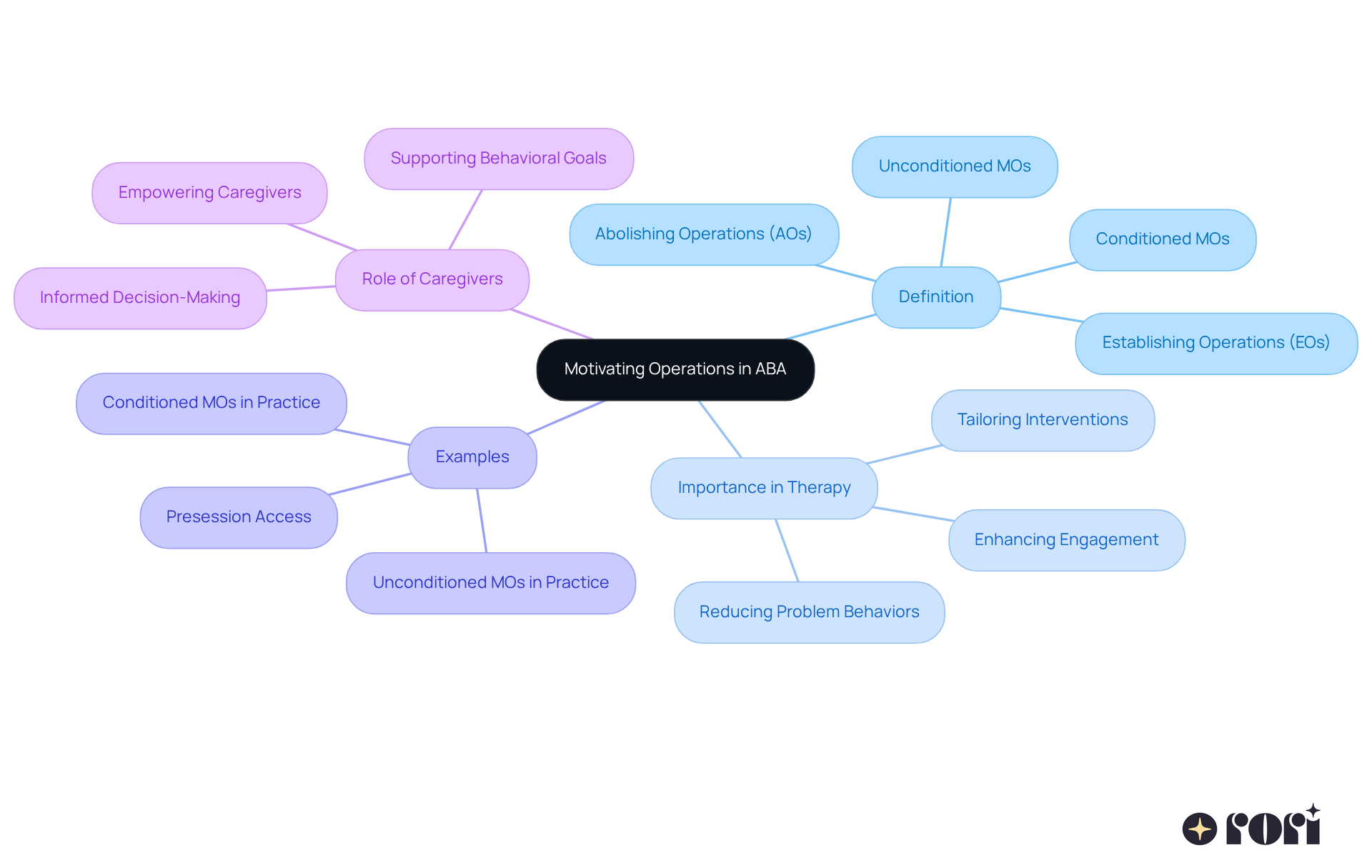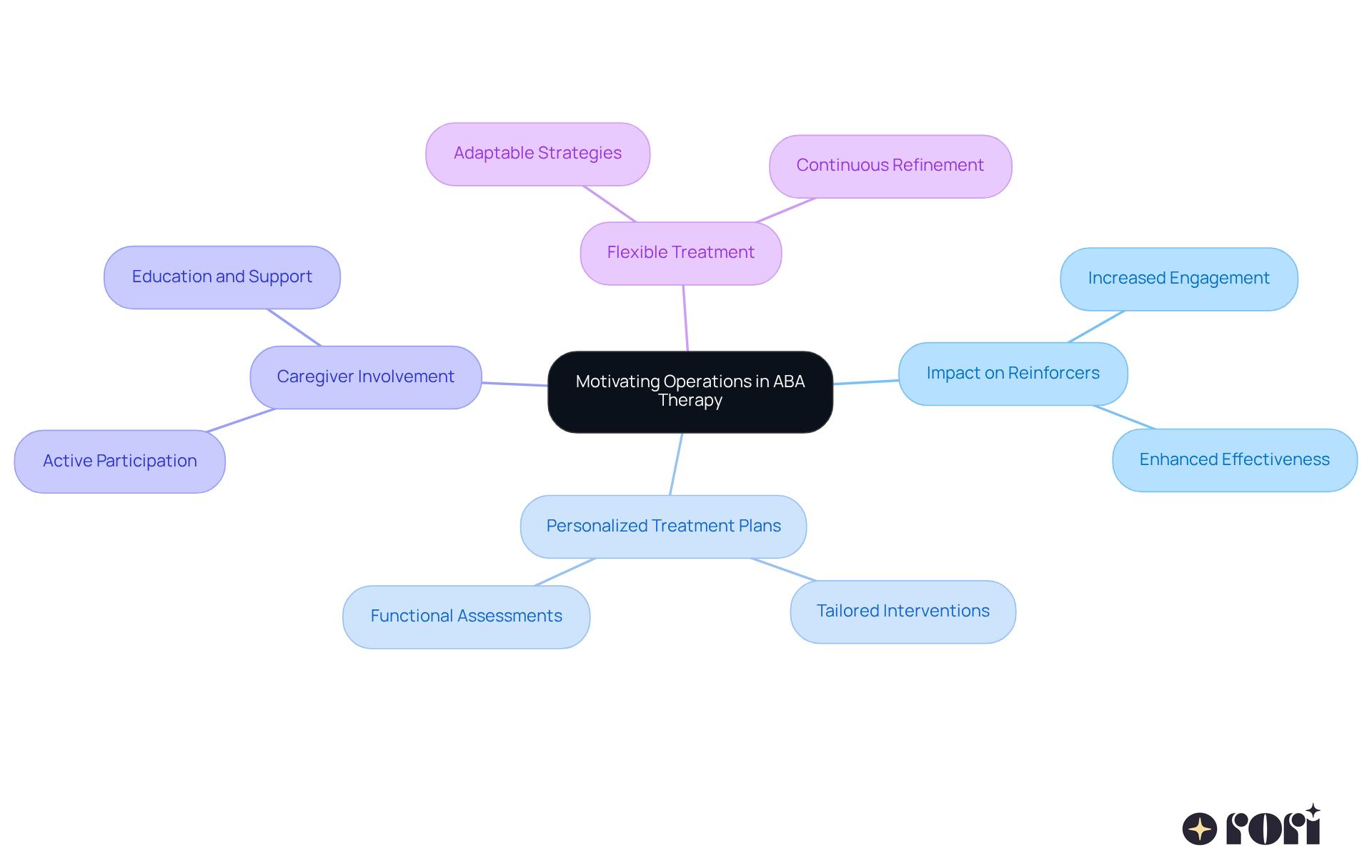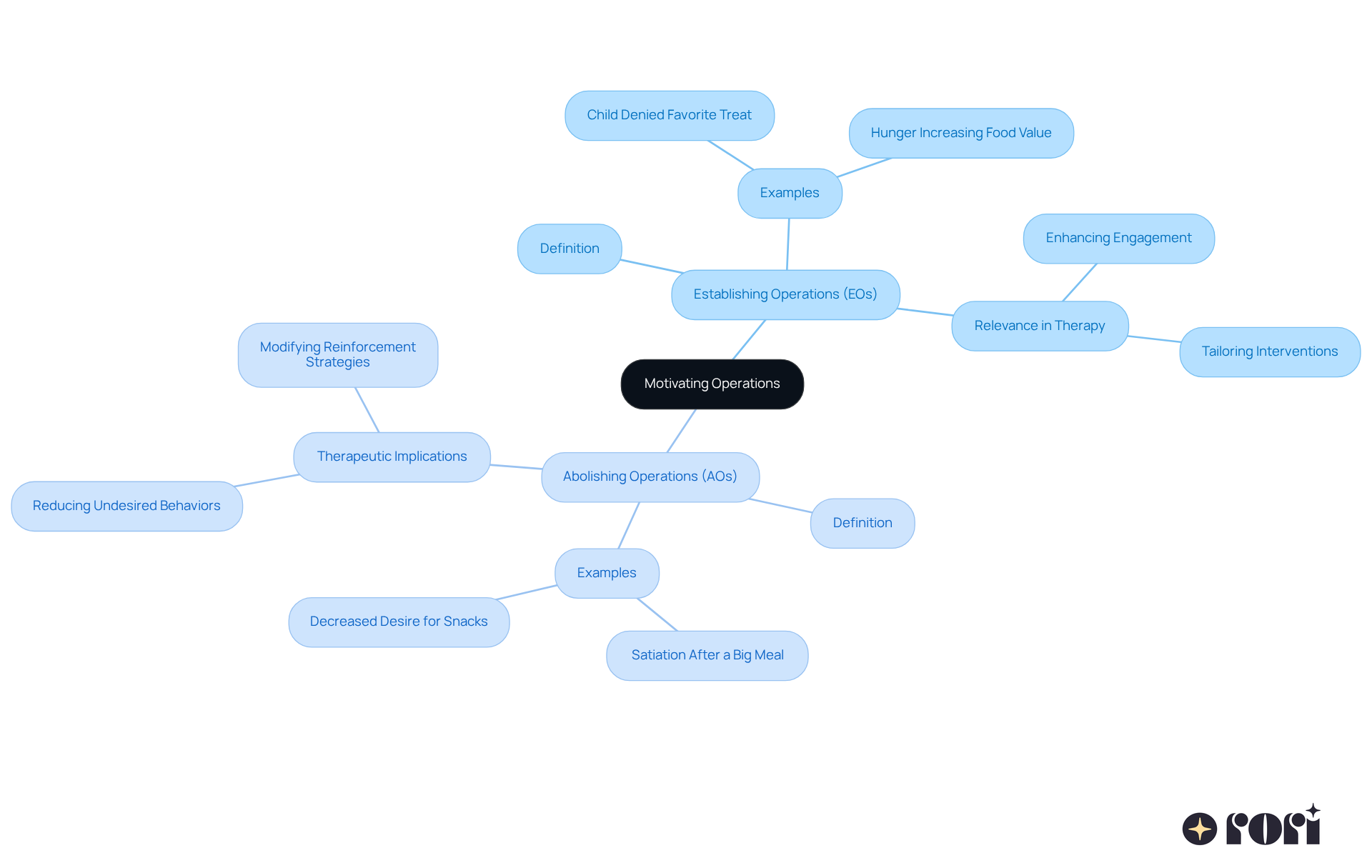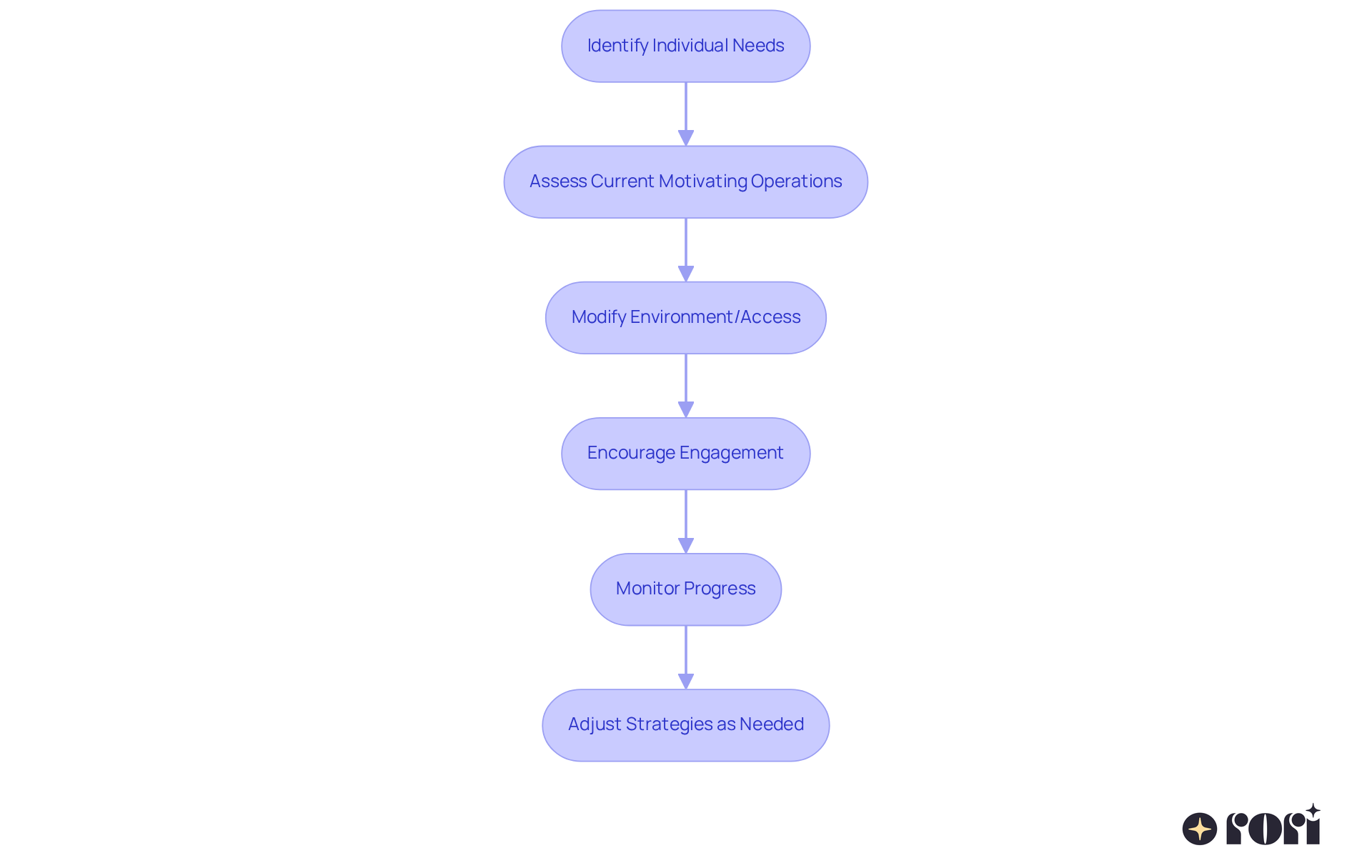This article dives into the importance of motivating operations (MOs) in Applied Behavior Analysis (ABA) therapy. It’s all about how these MOs can really impact the effectiveness of behavioral interventions. By getting to know and working with MOs—like establishing operations (EOs) and abolishing operations (AOs)—therapists can craft personalized treatment plans. This approach not only boosts motivation and engagement but also leads to better outcomes for individuals with autism.
Let’s explore this together! Understanding MOs can feel a bit overwhelming at first, but it’s so rewarding. Imagine a therapist who tailors their approach based on what truly motivates your child. This personalized touch can make all the difference! We’re here to help you every step of the way as you navigate this journey.
Understanding the dynamics of motivation can really enhance the effectiveness of ABA therapy, especially when we look at it through the lens of motivating operations (MOs). These environmental factors not only determine how desirable certain rewards are but also shape behaviors. So, grasping these concepts is essential for both clinicians and caregivers.
As practitioners dive into the details of MOs, a key question arises: how can we use these insights to create tailored interventions that truly resonate with the unique needs of individuals with autism? Exploring this idea opens up a pathway to more engaging and responsive therapy, one that empowers both children and their families on their journey toward positive behavioral change.
Let’s explore this together! We’re here to help you every step of the way!
The motivating operation definition ABA describes environmental events or conditions that can greatly influence our desire for certain rewards. They play a big role in whether we decide to take action or not. For instance, think about a young person feeling hungry—suddenly, food becomes super important, and they’re more likely to do things to get it.
Recent studies have shown just how crucial understanding motivating operation definition ABA is for effective ABA therapy. When clinicians grasp these concepts, they can tailor interventions that meet each individual's unique needs. For example, allowing access to favorite items before a session can lead to fewer behavioral issues and more engagement in academic activities. This really highlights the practical benefits of MOs in everyday life!
By understanding and modifying the motivating operation definitions in ABA, behavior analysts can develop effective behavior modification plans that promote positive outcomes for young individuals with autism. Plus, it’s essential to keep evaluating and adjusting these strategies to match the evolving needs of each child.
Empowering caregivers with ABA principles and strategies is key! It helps them actively support their child’s behavioral goals through informed decision-making and involvement. Together, we can work towards improved behavioral outcomes. Let’s explore this journey together!

The motivating operation definition ABA highlights the vital role of motivating operations (MOs) in ABA therapy, significantly impacting how effective reinforcers are and the likelihood of achieving desired actions. By understanding and adjusting the motivating operation definition aba, therapists can create the best conditions to enhance motivation and engagement during therapy sessions. For example, when a child is in a state of deprivation—like not having access to a favorite toy—they are more inclined to respond positively to that reinforcer. Therapists can use this insight to encourage desired actions effectively.
This tailored approach personalizes treatment plans and integrates evidence-based techniques used by analysts, leading to improved outcomes for individuals with autism. By weaving the motivating operation definition aba into their strategies, therapists cultivate a more engaging and responsive therapeutic environment, ultimately maximizing the potential for positive behavior change. Plus, when caregivers actively participate in grasping these principles, they boost their ability to support their child’s behavioral goals, resulting in informed decision-making and enhanced behavioral outcomes.
This collaborative effort ensures that treatment plans remain flexible and are consistently refined based on progress reports. Together, this empowers both the child and their caregivers throughout the therapeutic journey. Let’s explore this together! We’re here to help you every step of the way!

The motivating operation definition ABA highlights two main types: establishing operations (EOs) and abolishing operations (AOs), which are really interesting to understand. EOs make a reinforcer more appealing. For instance, think about a child who has been denied a favorite treat; suddenly, that snack becomes much more desirable! This encourages them to engage in behaviors that will help them get it. On the flip side, AOs reduce the appeal of a reinforcer. Imagine after a big meal; the desire for food decreases, making it less likely for them to seek out snacks.
For therapists, understanding the motivating operation definition ABA is extremely important. By manipulating these conditions, they can help bring about positive behavior changes and improve treatment outcomes for individuals with autism. By effectively using EOs and AOs, practitioners can create interventions that resonate with each child’s unique motivations. This personalized approach is a cornerstone of our program development service, ensuring that every behavioral plan is tailored to meet the specific needs and goals of the child.
Plus, the evidence-informed strategies used by analysis professionals play a crucial role in this process. They rely on research-supported methods to effectively address the motivating operation definition ABA. MOs are also key in functional communication training (FCT), helping to identify and influence the motivating factors behind actions. It’s fascinating to note that the motivating operation definition ABA has been a significant part of ABA since the 1980s, highlighting their role in shaping effective interventions.
By understanding and addressing MOs, practitioners can develop customized approaches that truly promote behavior change, enhancing intervention effectiveness and positively impacting family dynamics. Empowering caregivers with ABA principles and strategies allows them to actively participate in their child's development, leading to better behavioral outcomes and informed decision-making. Let’s explore this together! We’re here to help you every step of the way!

Incorporating the motivating operation definition aba into behavioral interventions is all about understanding each individual’s unique needs and circumstances. For example, a therapist might notice that a young person is more eager to engage socially when they’re feeling a bit deprived of social attention. By creating opportunities for social interaction during these times, the therapist can really boost the chances of positive social behaviors.
But that’s not all! MOs can also play a big role in teaching new skills. Imagine a young person learning to request items; a therapist might temporarily limit access to those items to increase motivation to express their needs. This thoughtful adjustment in the environment not only helps with skill development but also encourages young learners to actively participate in their educational journey.
The effectiveness of these approaches is supported by the motivating operation definition aba principles, which emphasize personalized planning and measurable goals tailored to each individual’s strengths and challenges. There are inspiring case studies that show just how impactful these strategies can be. For instance, one young individual who faced challenges during academic tasks made remarkable progress when MOs were applied. By providing some presession access to favorite items, this young person experienced fewer issues and became more engaged in their studies.
These findings truly underscore the vital role of the motivating operation definition ABA in shaping behavior and enhancing the effectiveness of ABA therapy, especially when caregivers are actively involved and equipped with the knowledge and skills to support their child’s goals. Plus, it’s worth mentioning that ABA therapy is the only scientifically proven treatment for autism that insurance covers, making it more accessible for families. Caregiver education is crucial in this journey, as it empowers caregivers to support their child’s therapy effectively, leading to better outcomes.
Let’s explore this together! We’re here to help you every step of the way!

Understanding the motivating operation definition in ABA therapy is key to enhancing therapeutic outcomes and connecting with individuals effectively. When we recognize how environmental events influence motivation, we can tailor our approaches to meet the unique needs of each child. This ensures that interventions are not only effective but also responsive to the individual’s circumstances.
The article highlights the importance of both establishing operations (EOs) and abolishing operations (AOs) in shaping behavior and motivation. By adjusting these factors, therapists can create the best conditions for learning and engagement, leading to improved behavioral outcomes. Plus, when caregivers actively participate in understanding and applying these principles, it enriches the therapeutic process, promoting informed decision-making and collaborative support.
Ultimately, embracing the concept of motivating operations in ABA therapy empowers both practitioners and families to foster positive behavior changes. By focusing on personalized interventions that adapt to evolving needs, the potential for success in behavioral goals increases significantly. This collaborative journey not only enhances the effectiveness of therapy but also builds a supportive environment that nurtures growth and development for individuals with autism. Let’s explore this together and see how we can make a difference!
What are motivating operations in ABA?
Motivating operations in ABA refer to environmental events or conditions that influence our desire for certain rewards, impacting whether we choose to take action.
How do motivating operations affect behavior?
They play a significant role in determining the importance of certain rewards, such as a person feeling hungry, which increases the likelihood of actions taken to obtain food.
Why is understanding motivating operations important for ABA therapy?
Understanding motivating operations is crucial for effective ABA therapy as it allows clinicians to tailor interventions to meet the unique needs of individuals, leading to better engagement and fewer behavioral issues.
How can motivating operations be applied in practice?
By allowing access to preferred items before a session, behavior analysts can enhance engagement in activities and reduce behavioral problems.
How do motivating operations contribute to behavior modification plans?
They enable behavior analysts to create effective behavior modification plans that promote positive outcomes, particularly for young individuals with autism.
Why is it important to evaluate and adjust strategies related to motivating operations?
It is essential to continuously evaluate and adjust strategies to align with the evolving needs of each child, ensuring that interventions remain effective.
How can caregivers be empowered with ABA principles?
Empowering caregivers with ABA principles and strategies helps them support their child's behavioral goals through informed decision-making and active involvement in the process.